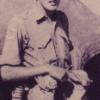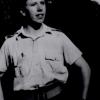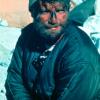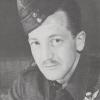Bill Kershaw born in 1923 lied about his age on joining the Royal East Kent Regiment in 1939. He decided to join the Paras, which had just started recruiting in 1940. Basic training at Hardwick Hall was he described ‘like a concentration camp, everything done at the double’. They looked forward to their parachute course because ‘none of us had been up in an aeroplane before’. Jumping from a hole in the floor of a Whitley bomber was, however, not what they had in mind, particularly during one training run when an engine caught fire. He never ‘rang the bell’, catching his nose on the side of the hole on exit, but ‘did not like the shuffle on his backside to get to the aperture’. Sitting with his knees up, he was invariably ‘glad to get out’. He was immensely proud to wear his red beret and wings, recalling ‘one of the blokes in London, who had wings on both arms and his chest as well!’
Bill was posted to the 4th Battalion the Parachute Regiment at Bulford where the rigorous physical training continued. Each week there was a five-mile cross country run and his motto was: ‘Bill, get out in front and break their hearts’. When 4 Para boarded a troopship for North Africa, he recalled they had been informed they were off for skiing in Scotland. They were in time for ‘mopping up’ at the campaign’s end.
Active service with the 2nd Independent Parachute Brigade followed in Italy in 1943. It was preceded by their troop ships disembarking in Taranto harbour. This was a virtual assault landing, the ship ‘was driven in like a racing car and we leaped onto the quayside’ he recalled. With typical airborne humour he described his first patrol, sent out to locate the Germans. ‘The Second Front started up with only four of us, sod it’ they decided, ‘we’re going to have a brew up first!’
Campaigning in Italy during 1943 was both costly and physically hard. They were not happy when the 1st Airborne Division returned home in preparation for D-Day, leaving the Independent Brigade, the ‘D-Day Dodgers’ behind. Many of the soldiers in 4 Para ‘were not too pleased, some of the guys had been abroad for four or five years’. Campaigning in Italy was harsh.
The Dakota drop into the South of France in August 1944 was an ‘absolute disaster’ Bill recalled. ‘We were 35 miles from the dropping zone, the starboard engine got hit and was on fire, which left only the port engine on full bore, which had a job to climb up so we could get out of the door’. Separated from their main unit, the stick split up into small groups and tried to exfiltrate back to 4 Para. They were joined by a similarly cut-off group of ‘Yanks’ en route. They ambushed a German column and took 40 prisoners. Two million franks were liberated from the wallet of a ‘cocky Oberleutnant’, of which some was shared out and the rest handed in. Rings and watches were purchased and the loot stashed in a kit bag, ‘which was sunk’, Bill ruefully admitted ‘in a boat on the way home’. The group eventually reached the American lines, which he recalled was a matter of ‘shoot first and ask after’.
The next excitement was the Megera drop outside Athens in October 1944, conducted in appallingly windy conditions. ‘I did not have a bad landing’ was Bill’s understated assessment, ‘but the mine detector I was carrying was smashed to pieces, the heavy load had cut down my oscillation.’ Many men were seriously injured on a hard and rocky DZ, which was ‘not a good choice’. Street fighting followed against insurgents in Athens during the winter of 1944-5. The objective he recalled was to keep the warring Greek factions apart. ‘If someone has a gun, they got shot’ he remembered. The insurgents were untrained, virtual ‘target practice, they must have been on drugs or something’. 4 Para aggressively took on the opposition which they described as ‘full of themselves until they came up against it’.
The war was now becoming complex and confusing. Bulgarians press-ganged into the German army were let go on the Yugoslav border and given five rounds each to protect themselves. Italians had to be protected to be flown home, while German prisoners were virtually unguarded because they chose not to take their chances among the vindictive Greeks.
Bill’s final active service in Palestine between 1945-8 was equally puzzling; by this time he had been promoted Corporal. ‘We were sent there so the Arabs and Jews could shoot at us rather than each other’ he ironically recalled ‘after they got down to the serious business of killing each other’. He drove liberty trucks in Tel Aviv and ‘got a general bollocking for spraying stone throwing kids with fire extinguishers, apparently forty were admitted to hospital claiming chemical infections!’
He left Lydd airport for the UK and was demobbed in 1948. I remember Bill as a bus driver as a kid in England, he had always driven for the army. He went on to work in Sales and enjoyed a long retirement and was very active in the Orpington and Chislehurst branch of the Parachute Regiment Association. He has passed away at 88 years, leaving Jenny and two step children.
Much of the information for this piece came from an interview conducted in 2009. Bill Kershaw was the archetypal Second World War ‘Tom’, phlegmatic, understated and with a wicked sense of humour, evident throughout his interview. He defined the ‘airborne spirit’ as quite simply ‘if you had something they didn’t have, you gave them half, you broke a cigarette in half’.
Written by Col. Robert Kershaw
Read More




Latest Comments
There are currently no comments for this content.
Add Comment
In order to add comments you must be registered with ParaData.
If you are currently a ParaData member please login.
If you are not currently a ParaData member but wish to get involved please register.